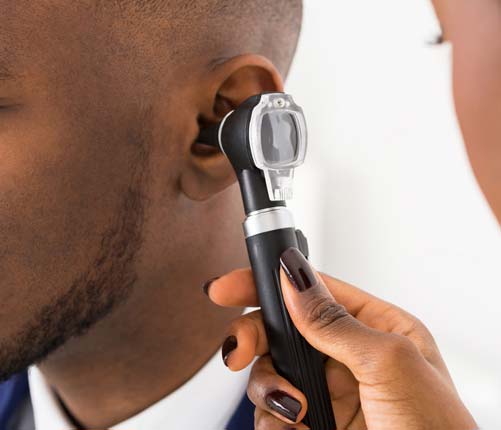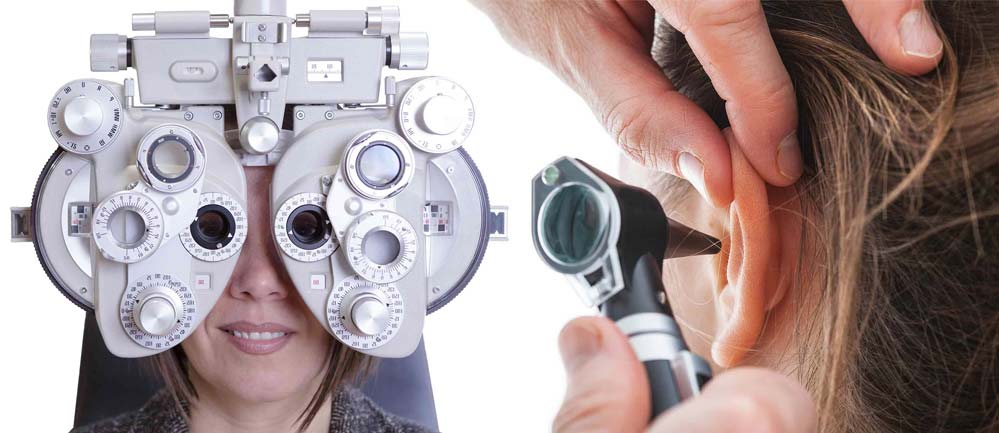Posted by: Eye Centers of Florida in Uncategorized
Are Eye Problems and Hearing Problems Related?
Annual eye exams are crucial for everyone, but especially for those over the age of 60. Eye conditions like glaucoma and cataracts become more common as we age, and early detection is critical in treating these diseases. Eye exams can also help uncover symptoms of other significant health risks, such as the warning signs for hypertension and diabetes.
But when was the last time you had a hearing exam?
It’s commonly thought that “when you lose one sense, the others become stronger.” Some people who lose their vision during childhood, for example, are able to rely on their hearing to get around.
For the older population — for whom hearing and vision problems often go hand-in-hand — losing both senses at once can be devastating to their quality of life because it compromises their two primary modes of communication.
But, are eye problems and hearing problems related to one another? The short answer is YES!
Links Between Eye Problems and Hearing Problems

The human body is complicated and intricately connected. Our eyes and ears work together more than we realize, and the decline of one can adversely affect the other.
Studies have shown a strong association between age-related eye conditions and hearing loss, which suggests common risk factors or biological aging markers for the onset of both.
The association between hearing loss and both cataracts and age-related maculopathy (macular degeneration) is especially clear from multiple studies done on patients between the ages of 60 and 90.

Data showed the correlation between vision and hearing loss was strongest in seniors under the age of 70, which indicates that early detection of hearing and vision-related problems is critical in treating both.
Links Between Dementia and Vision & Hearing Loss

Research has also shown that elderly people with both hearing and vision problems are far less socially active than their peers. However, the dangers of vision and hearing loss for seniors run deeper than a feeling of loneliness and isolation as a result of their difficulty to communicate.
Studies have indicated that seniors who have higher levels of social interaction are less likely to develop dementia. Interacting with others makes the brain work to comprehend, reason, and formulate responses, which goes a long way to preserve cognitive function.
Links Between Dementia and Vision & Hearing Loss
Research has also shown that elderly people with both hearing and vision problems are far less socially active than their peers. However, the dangers of vision and hearing loss for seniors run deeper than a feeling of loneliness and isolation as a result of their difficulty to communicate.
Studies have indicated that seniors who have higher levels of social interaction are less likely to develop dementia. Interacting with others makes the brain work to comprehend, reason, and formulate responses, which goes a long way to preserve cognitive function.
The Importance of Annual Hearing and Eye Exams

Age-related vision problems may occur gradually, which is why an annual eye exam is so important for seniors. However, hearing loss may be even harder to detect, so it’s a very good idea to schedule a hearing exam along with your annual eye exam.
As with any age-related condition, early detection is absolutely critical, especially for those who already have conditions such as diabetes. People with diabetes are more susceptible to hearing loss due to restricted blood flow to the nerves and may also develop an eye condition called diabetic retinopathy, which can ultimately result in blindness.

Where Do I Go From Here?
If you’re experiencing simultaneous hearing and vision problems, you’re not alone. Even if you’re only experiencing one or the other, getting both checked out may still be wise. When you schedule your annual eye exam at Eye Centers of Florida, you can also schedule a FREE hearing assessment with our hearing aid specialist, Chris Trimble. Your eyes and ears will thank you!
